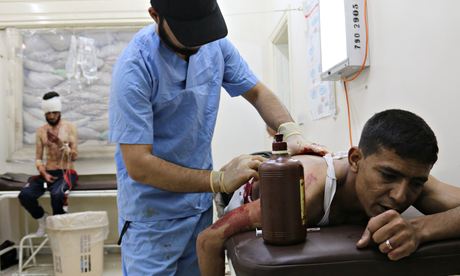• Map showing attacks on hospitals and clinics in Syria

A wounded man is treated at a makeshift hospital following a reported bombardment with explosive-packed "barrel bombs" by Syrian government forces. Photograph: Zein Al-Rifai/AFP/Getty Images
Syrian government forces have systematically attacked the healthcare system in opposition-held areas of the country over the past three years, resulting in the deaths of more than 460 health professionals and widespread destruction to hospitals and clinics, according to a major study.
Physicians for Human Rights (PHR), a US-based international NGO, has found that government forces were to blame for 90% of the confirmed 150 attacks on 124 facilities from the start of the Syrian uprising in March 2011 to March 2014, as plotted on an interactive map that will be regularly updated.
"The systematic nature of these attacks reflects the government's indifference to the health and life of civilians, which has created a public health crisis that will haunt Syria for years," said Erin Gallagher, PHR's director of emergency investigations and response. "Doctors and nurses who are committed to caring for everyone, regardless of political beliefs, are being killed while trying to save lives under gruelling circumstances."
According to UN estimates, 245,000 people in Syria are living in besieged areas, cut off from food, water, and medical supplies. Almost half of all public hospitals have been partially or totally destroyed. The overall death toll in the crisis so far exceeds 150,000. Up to 2.5 million people have fled abroad and 9 million people inside Syria need help in what the UN has described as the world's worst humanitarian crisis in modern times.
"As doctors, we are often perceived to be the enemy because we treat everyone regardless of their political views," said a physician in Aleppo, who did not want to be identified for security reasons. "We take great risks to do our jobs at a time when our skills are greatly needed. War has ravaged our country's health system, and attacking hospitals and doctors has made this horrible situation even worse."
Attacks on medical professionals, facilities, and supplies during armed conflict violate the Geneva conventions. When the attacks are widespread or systematic, they constitute a crime against humanity.
"Syria is among the worst examples of targeting medical care as a weapon of war," said Donna McKay, PHR's executive director. "We must not allow these rampant abuses to become the new norm in conflict."
PHR said it hopes the information in its map will prompt the UN security council to implement the resolution demanding increased humanitarian aid to people living in besieged areas, including medical supplies. PHR also calls on all parties to the conflict to demilitarise hospitals and honour international humanitarian laws protecting medical personnel and facilities.
Syrian government forces are responsible for the majority of violations, but the map indicates that attacks by anti-government rebels are increasing, with nine of the 10 attacks committed by opposition groups occurring since March 2013.
PHR collected the data from sources inside Syria as well as open sources in English and Arabic, including UN, government, and non-governmental reports; news articles; and social media. Given the volatile conditions on the ground, PHR was unable to collect comprehensive data on all the attacks and killings of healthcare providers. PHR identified 150 attacks using multiple sources to corroborate the data.

No comments:
Post a Comment